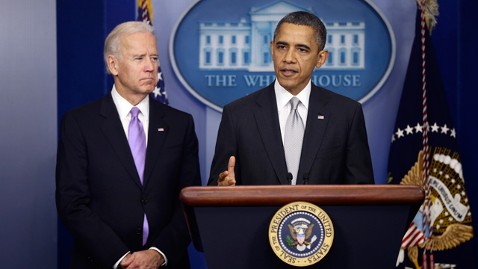Some Gun Measures Broadly Backed But the Politics Show an Even Split

While Senate negotiators struggle for a deal on mandatory background checks at gun shows, the latest ABC News/Washington Post poll finds vast public support for the measure, as well as for a committee-approved step to make illegal gun sales a federal crime.
A smaller majority, 57 percent, also continues to favor banning assault weapons, a measure said to be less likely to prevail in Congress. Support has declined slightly for a fourth proposal, the National Rifle Association's suggestion to place armed guards in public schools.
See PDF with full results and charts here.
With a hearing by the Senate Judiciary Committee scheduled for today, the poll also shows a sharp political divide on gun control: Americans split evenly, 42-41 percent, on whom they trust more to handle the issue, Barack Obama, who's been pushing such measures, or the Republicans in Congress, many of whom have been resisting them.
That result reflects the crosscurrents in attitudes on gun control. On one hand the public supports "stricter gun control laws in this country" in general by a fairly narrow 52 to 45 percent, essentially unchanged recently and down from its levels in most of the previous two decades. But support is higher on some specifics; a nearly unanimous 91 percent favor mandatory background checks on gun show sales, and 82 percent support making illegal gun sales a federal crime. Notably, even among opponents of stricter gun control in general, 85 and 73 percent, respectively, support these measures.
The Judiciary Committee last week approved a bill making gun trafficking a federal offense. It's also looking at background checks, limits on assault weapons and high-capacity magazines and aid for more safety equipment in schools. All come in response to the shootings that killed 26 at a schoolhouse in Newtown, Connecticut, in December.
Support for banning assault weapons is almost identical to its level in January, albeit, like views on gun control in general, down from support in the past, which peaked at or near 80 percent in the 1990s. Placing an armed guard in every public school, supported by 55 percent in January, slipped to 50 percent now. Critics have focused on the cost, among other issues; support is down most sharply among Republicans, men and people in gun-owning households.
OWNERSHIP - The prevalence of guns is one factor in these views; 42 percent of adults in this survey, produced for ABC by Langer Research Associates, report that they or someone in their house owns a gun, essentially steady in ABC/Post polls since 1999. (It's ranged from 41 to 46 percent, averaging 43 percent in a dozen surveys.)
Gun ownership is far more prevalent among Republicans, 62 percent, dropping to 42 percent among independents and 26 percent among Democrats. It's more than twice as common among conservatives as among liberals, and nearly doubly common in rural compared with urban areas.
Attitudinal differences follow those patterns. People in gun-owning households prefer the Republicans in Congress over Obama to handle gun control by 56-26 percent; those in non-gun homes prefer Obama by almost an identical margin, 58-26 percent. Compared with non-owners, people in gun households are 37 percentage points more apt to oppose gun control in general and 23 points more likely to oppose banning assault weapons.
At the same time, there's common ground on other areas, with only 2 to 5 points of difference between members of gun households and non-gun owners in support for gun-show background checks, a federal law against illegal gun sales and armed guards in schools.
GROUPS - Beyond Democrats, liberals, non-gun owners and city dwellers, women are more apt than men to favor stricter gun control in general (60 percent vs. 44 percent); there's a similar gap between women and men on banning assault weapons.
Overall support for stricter gun control also peaks among nonwhites, at 67 percent, and the most-educated adults, at 62 percent, vs. the least educated. Lastly, support also is much higher among Catholics as opposed to evangelical white Protestants, a politically conservative group, 61 vs. 32 percent.
METHODOLOGY - This ABC News/Washington Post poll was conducted by telephone March 7-10, 2013, among a random national sample of 1,001 adults, including landline and cell-phone-only respondents. Results have a margin of sampling error of 3.5 points, including design effect. Partisan divisions are 33-25-35 percent, Democrats-Republicans-independents.
The survey was produced for ABC News by Langer Research Associates of New York, N.Y., with sampling, data collection and tabulation by Abt-SRBI of New York, N.Y.